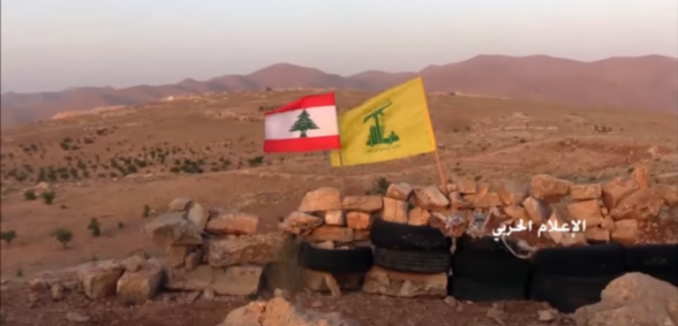The Shiite terrorist group Hezbollah recently claimed several victories against Sunni jihadists in the Lebanon-Syria border region, with the help of the Lebanese Armed Forces (LAF).
Since launching its offensive on Friday, the Iranian proxy shared multiple videos documenting its advances, the Long War Journal reported. In one clip, its fighters are seen capturing a hill outside the northeastern Lebanese town of Arsal. In another, Hezbollah fighters and Syrian troops are seen beating back Sunni jihadists in Syria’s western Qalamoun district.
Hezbollah also claimed to have captured the Syrian town of Fleita and surrounding areas with the Syrian army.
While the group released several infographics showing its progress, these don’t show the positions of the LAF. However, an English translation of one graph by the Beirut-based The Daily Star does mark LAF positions.
Despite denials by Lebanese Prime Minister Saad Hariri, who is in Washington asking the United States to maintain its funding of the LAF, evidence shows that “the LAF is coordinating its efforts near Arsal with the Hezbollah-led offensive on the border,” which includes the regime of Bashar al Assad, the Long War Journal noted. “Lebanese troops are said to be positioned on the outskirts of Arsal to prevent the flow of jihadists into the city. The Shiite forces appear to be undertaking the brunt of the military operation.”
Lebanese President Michel Aoun, an ally of Hezbollah, said in an interview earlier this year that “As long as the Lebanese army is not strong enough to battle Israel … we feel the need for [Hezbollah’s] existence.” He added that Hezbollah “has a complementary role to the Lebanese army.”
United Nations Security Council Resolution 1701, which was unanimously adopted in 2006, demands “the disarmament of all armed groups in Lebanon, so that, pursuant to the Lebanese cabinet decision of 27 July 2006, there will be no weapons or authority in Lebanon other than that of the Lebanese State.” Despite this, Aoun has continued to defer to Hezbollah, reflecting the influence that the Iranian proxy wields over Beirut. Aoun’s support of Hezbollah prompted King Salman of Saudi Arabia to cancel a trip to Lebanon that was scheduled for March of this year.
An Iranian official close to Supreme Leader Ayatollah Ali Khamenei boasted in 2014 that Iran controlled capitals in four other countries: Sanaa, Yemen; Damascus, Syria; Baghdad, Iraq; and Beirut, Lebanon.
Pro-Hezbollah media reported in February that the terrorist group had received “game-changing” weaponry from Iran. That same month, Hezbollah leader Hassan Nasrallah warned that his group could use its advanced rocket arsenal to attack Israel’s nuclear reactor in Dimona. Earlier this month, it was reported that Iran built two underground arms factories in Lebanon for Hezbollah, including one to produce rockets.
Hezbollah’s growing military capabilities have been an Israeli concern for years. Nasrallah admitted in June 2016 that “Hezbollah’s budget, its income, its expenses, everything it eats and drinks, its weapons and rockets, are from the Islamic Republic of Iran,” and insisted that his group “will not be affected” by American sanctions on Iran. “As long as Iran has money, we have money… Just as we receive the rockets that we use to threaten Israel, we are receiving our money. No law will prevent us from receiving it,” he stated.
Nasrallah’s acknowledgement of Iranian aid seems to confirm a public assurance given to him in August 2015 by Iranian Foreign Minister Mohammad Javad Zarif that the nuclear deal Iran reached with global powers presented “a historic opportunity” to confront Israel. Iran announced in June 2016 that its defense spending would increase by 90% in 2017.
[Photo: الاعلام الحربي المركزي / YouTube]




